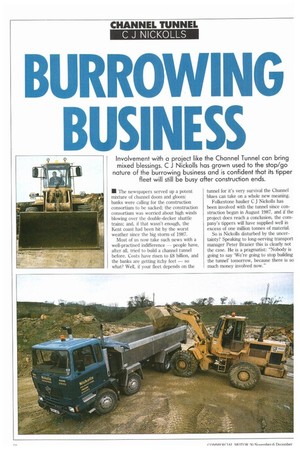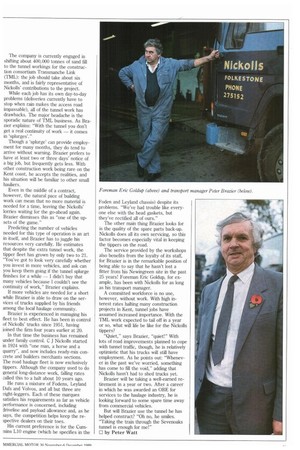BURROWING BUSINESS
Page 60

Page 61

If you've noticed an error in this article please click here to report it so we can fix it.
• The newspapers served up a potent mixture of chunnel doom and gloom: banks were calling for the construction consortium to be sacked; the construction consortium was worried about high winds blowing over the double-decker shuttle trains; and, if that wasn't enough, the Kent coast had been hit by the worst weather since the big storm of 1987.
Most of us now take such news with a well-practised indifference — people have, after all, tried to build a channel tunnel before. Costs have risen to £.8 billion, and the banks are getting itchy feet — so what? Well, if your fleet depends on the tunnel for it's very survival the Chunnel blues can take on a whole new meaning.
Folkestone haulier C J Nickolls has been involved with the tunnel since construction began in August 1987, and if the project does reach a conclusion, the company's tippers will have supplied well in excess of one million tonnes of material.
So is Nickolls disturbed by the uncertainty? Speaking to long-serving transport manager Peter Brazier this is clearly not the case. He is a pragmatist: "Nobody is going to say 'We're going to stop building the tunnel' tomorrow, because there is so much money involved now." The company is currently engaged in shifting about 400,000 tonnes of sand fill to the tunnel workings for the construction consortium Transmanche Link (TML): the job should take about six months, and is fairly representative of Nickolls' contributions to the project.
While each job has its own day-to-day problems (deliveries currently have to stop when rain makes the access road impassable), all of the tunnel work has drawbacks. The major headache is the sporadic nature of TML business. As Brazier explains: "With the tunnel you don't get a real continuity of work — it comes in `splurges'."
Though a 'splurge' can provide employment for many months, they do tend to arrive without warning. Brazier prefers to have at least two or three days' notice of a big job, but frequently gets less. With other construction work being rare on the Kent coast, he accepts the realities, and his situation will be familiar to other small hauliers.
Even in the middle of a contract, however, the natural pace of building work can mean that no more material is needed for a time, leaving the Nickolls' lorries waiting for the go-ahead again. Brazier dismisses this as "one of the upsets of the game."
Predicting the number of vehicles needed for this type of operation is an art in itself, and Brazier has to juggle his resources very carefully. He estimates that despite the extra tunnel work, the tipper fleet has grown by only two to 21. "You've got to look very carefully whether you invest in more vehicles, and ask can you keep them going if the tunnel splurge finishes for a while — I didn't buy that many vehicles because I couldn't see the continuity of work," Brazier explains.
If more vehicles are needed for a short while Brazier is able to draw on the services of trucks supplied by his friends among the local haulage community.
Brazier is experienced in managing his fleet to best effect. He has been in control of Nickolls' trucks since 1951, having joined the firm four years earlier at 20.
In that time the business has remained under family control. C J Nickolls started in 1924 with "one man, a horse and a quarry", and now includes ready-mix concrete and builders merchants sections. The road haulage fleet is now exclusively tippers. Although the company used to do general long-distance work, falling rates called this to a halt about 10 years ago.
He runs a mixture of Fodens, Leyland Dafs and Volvos, and all but three are eight-leggers. Each of these marques satisfies his requirements as far as vehicle performance is concerned, including clriveline and payload allowance and, as he says, the competition helps keep the respective dealers on their toes.
His current preference is for the Cummins L10 engine (which he specifies in the Foden and Leyland chassis) despite its problems. "We've had trouble like everyone else with the head gaskets, but they've rectified all of ours."
The other main thing Brazier looks for is the quality of the spare parts back-up. Nickolls does all its own servicing, so this factor becomes especially vital in keeping the tippers on the road.
The service provided by the workshops also benefits from the loyalty of its staff, for Brazier is in the remarkable position of being able to say that he hasn't lost a fitter from his Newingreen site in the past 25 years! Foreman Eric Goldup, for example, has been with Nickolls for as long as his transport manager.
A committed workforce is no use, however, without work. With high interest rates halting many construction projects in Kent, tunnel jobs have assumed increased importance. With the TML work expected to tail off in a year or so, what will life be like for the Nickolls tippers?
"Quiet," says Brazier, "quiet!" With lots of road improvements planned to cope with tunnel traffic, though, he is relatively optimistic that his trucks will still have employment. As he points out: "Whenever in the past we've worried, something has come to fill the void," adding that Nickolls hasn't had to shed trucks yet.
Brazier will be taking a well-earned retirement in a year or two. After a career in which he was awarded an OBE for services to the haulage industry, he is looking forward to some spare time away from commercial vehicles.
But will Brazier use the tunnel he has helped construct? "Oh no, he smiles. "Taking the train through the Sevenoaks tunnel is enough for me!"
by Peter Watt
















































































































